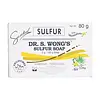What's inside
What's inside
 Key Ingredients
Key Ingredients

No key ingredients
 Benefits
Benefits

 Concerns
Concerns

No concerns
 Ingredients Side-by-side
Ingredients Side-by-side

Elaeis Guineensis Oil
EmollientElaeis Guineensis Kernel Oil
EmollientMaris Sal
Skin ConditioningSulfur
AntiseborrhoeicAloe Barbadensis Leaf Extract
EmollientWater
Skin ConditioningOlea Europaea Fruit Oil
MaskingButyrospermum Parkii Butter
Skin ConditioningAnthemis Nobilis Flower Oil
MaskingPersea Gratissima Oil
Skin ConditioningCamellia Sinensis Leaf Extract
AntimicrobialGlycerin
HumectantParfum
MaskingTocopheryl Acetate
AntioxidantSodium Hydroxide
BufferingButylene Glycol
HumectantTriticum Vulgare Germ Oil
EmollientHamamelis Virginiana Water
AstringentHydroxyisohexyl 3-Cyclohexene Carboxaldehyde
MaskingCI 47005
Cosmetic ColorantElaeis Guineensis Oil, Elaeis Guineensis Kernel Oil, Maris Sal, Sulfur, Aloe Barbadensis Leaf Extract, Water, Olea Europaea Fruit Oil, Butyrospermum Parkii Butter, Anthemis Nobilis Flower Oil, Persea Gratissima Oil, Camellia Sinensis Leaf Extract, Glycerin, Parfum, Tocopheryl Acetate, Sodium Hydroxide, Butylene Glycol, Triticum Vulgare Germ Oil, Hamamelis Virginiana Water, Hydroxyisohexyl 3-Cyclohexene Carboxaldehyde, CI 47005
 Reviews
Reviews

Ingredients Explained
These ingredients are found in both products.
Ingredients higher up in an ingredient list are typically present in a larger amount.
Aloe Barbadensis Leaf Extract is an extract of the leaves of the aloe, Aloe barbadensis, Liliaceae.
Aloe is one of the most well-known natural soothing ingredients, and for good reason. It’s full of water and has a cooling, calming effect on the skin, especially when it’s sunburned, itchy, or irritated. Aloe also helps your skin stay hydrated and smooth by mimicking what healthy skin naturally produces. On top of that, it contains vitamins and nutrients that support skin recovery.
It doesn’t protect you from the sun, but it can help your skin bounce back after too much time in it.
Let’s get into the details:
Aloe contains antioxidant Vitamins A, C, and E, which help fight off free radicals (unstable molecules from things like pollution that can damage your skin).
It’s also rich in polysaccharides, which are natural sugars that help hydrate the skin by acting like the skin’s own moisturizing agents. These, along with other sugars like monosaccharides, help form a protective barrier that locks in moisture.
Aloe works as both a humectant and an emollient. That means it draws water into the skin (humectant) and helps trap it there (emollient), making it an effective natural moisturizer.
You’ll also find a mix of other skin-supporting ingredients in aloe, including folic acid, choline, calcium, amino acids, fatty acids, and even Vitamin B12.
Out of the 420+ species of aloe, Aloe barbadensis is the most widely used in skincare products thanks to its gentle yet effective properties.
There are over 420 species of aloe but Aloe Barbadensis is the most commonly used for topical products.
Learn more about Aloe Barbadensis Leaf ExtractSulfur is a commonly occurring element on Earth (and our universe!). In cosmetics, it helps kill bacteria, reduces sebum, and provides exfoliation. This makes it an effective ingredient to reduce breakouts and fight acne.
As a ketayolytic agent, it breaks down the top layer of skin. This is a form of exfoliation and may help decrease acne and hyperpigmentation.
Studies show sulfur has antibacterial and antifungal properties. Sulfur can be drying if used excessively or at higher concentrations. We recommend speaking with a medical professional if you have any concerns.
Ancient Greece, India, China, and Egypt have used sulfur in both traditional medicines and for household use.
Learn more about Sulfur